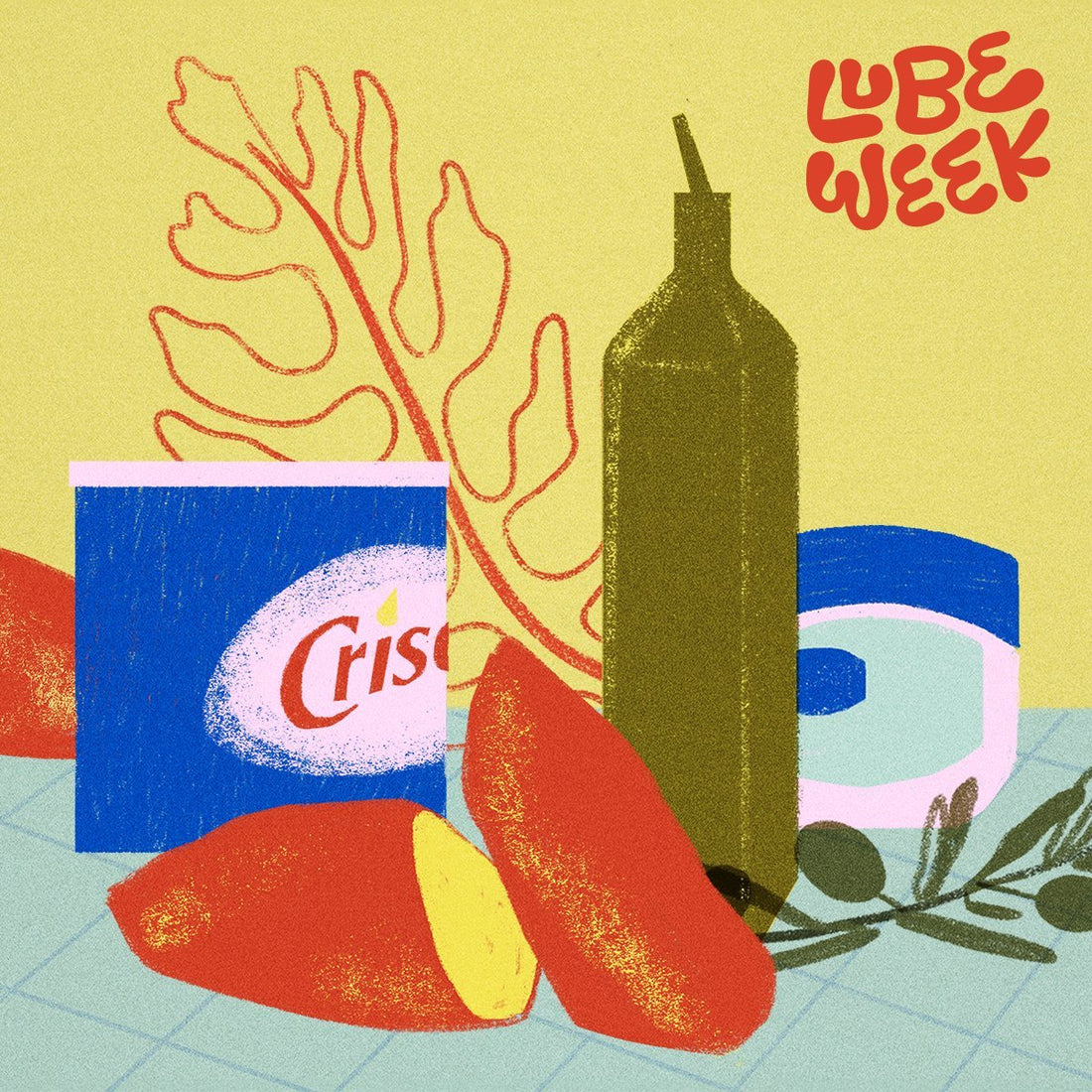Nowadays, in major drug stores and at most sex shops, you can find a few brands of lube on the shelves to ensure sex proceeds as smoothly as possible. But lube has existed long before it was manufactured for that specific purpose. In fact, the history of lube goes back thousands of years. The first known iteration of lube came from the ancient Greeks, who used olive oil to keep things slippery during sex. Olive oil’s earliest recorded use for sexual purposes was in 350 B.C. It was even (incorrectly) believed that olive oil could prevent pregnancy; Aristotle wrote in The History of Animals that “if the parts be smooth conception is prevented.” Two centuries later, in Japan, people grated yams to create tororo-jiru, a yam soup that doubled as lube. The Japanese, as well as those in Korea and China, also employed a substance called carrageenan, which was made by boiling red seaweed, for sexual lubrication. The world’s first commercial lube came from KY Jelly in 1904. However, it was originally patented as a surgical aid, and it only began being marketed for sexual purposes in 1917. And even then, you needed a prescription for it. It wasn’t until 1980 that it became available over-the-counter. “Lubricants as we know them today are especially a product of the 1980s,” says Good Vibrations’ staff sexologist Carol Queen. In fact, until the 1990s, lube was still mainly known as the substance doctors put on speculums before gynecological exams, and very few brands were widely known, says Queen.
The attention the gay community brought to lube made it more widely available to everyone.
In the '70s and '80s, even as lubricants were popping up, people still used household items like olive oil, Vaseline, and Crisco as lube, says Lynn Comella, Associate Professor of Gender and Sexuality Studies at the University of Nevada-Las Vegas and author of Vibrator Nation: How Feminist Sex-Toy Stores Changed the Business of Pleasure. There’s even documentation of a San Francisco S&M club in the ‘70s and ‘80s that put out cans of Crisco before every party, she says. The 1970s edition of the famous women’s sexual self-help book Our Bodies, Ourselves mentions lube only briefly as either an anal sex aid or a remedy for painful intercourse, says Comella. Accordingly, a 1975 mail order catalog for the feminist sex shop Eve’s Garden contained only one lube called “Love Oil,” which advertised its ability to “sooth and lubricate the genitals.” Ten years later, however, Good Vibrations’ first catalog included four lubes: Probe, Astroglide, ForPlay, and PrePair.  The AIDS crisis brought further attention to lube, as it was encouraged as a way to prevent tearing that could lead to STIs. At the time, lube was mainly associated with anal sex, which in turn was mainly associated with gay men. However, the attention the gay community brought to lube made it more widely available to everyone. By the end of the ‘80s, lube appeared in drugstores in the Bay Area, where HIV was a high-profile issue, says Queen. The earliest lubes Queen remembers selling at Good Vibrations, where she started working in 1990, were Astroglide, Probe, and Slippery Stuff. In the early to mid-'90s, people began using cream lubricant, which was mainly imported from England, says Queen. “Lots of people adored this stuff,” she says. “It was substantially different from water-based lubricants because it didn't get sticky, which was (and probably largely remains) customers' biggest complaint about lube.” Up until the year 2000, some lubes used an ingredient called nonoxynol-9, which, besides being a spermicide, was believed to prevent STIs because it killed HIV in vitro. However, in the late ‘90s, researchers began to realize that it could actually increase STI risk, since it made it easier for what it did not kill to get into the bloodstream, Queen explains. The World Health Organization issued a warning about it in 2000, and sex shops stopped selling it.
The AIDS crisis brought further attention to lube, as it was encouraged as a way to prevent tearing that could lead to STIs. At the time, lube was mainly associated with anal sex, which in turn was mainly associated with gay men. However, the attention the gay community brought to lube made it more widely available to everyone. By the end of the ‘80s, lube appeared in drugstores in the Bay Area, where HIV was a high-profile issue, says Queen. The earliest lubes Queen remembers selling at Good Vibrations, where she started working in 1990, were Astroglide, Probe, and Slippery Stuff. In the early to mid-'90s, people began using cream lubricant, which was mainly imported from England, says Queen. “Lots of people adored this stuff,” she says. “It was substantially different from water-based lubricants because it didn't get sticky, which was (and probably largely remains) customers' biggest complaint about lube.” Up until the year 2000, some lubes used an ingredient called nonoxynol-9, which, besides being a spermicide, was believed to prevent STIs because it killed HIV in vitro. However, in the late ‘90s, researchers began to realize that it could actually increase STI risk, since it made it easier for what it did not kill to get into the bloodstream, Queen explains. The World Health Organization issued a warning about it in 2000, and sex shops stopped selling it.
Today, the lube industry is worth an estimated $400 million, and KY is sold in more than 50 countries.
Even lubes that do appear to be made with safe ingredients still struggle to gain FDA approval, which is required because the agency classifies them as medical devices. Many independent lube companies have complained about the hurdles of getting their products to the market, even as mainstream brands with more questionable ingredients gain approval. The blockages to lube use aren’t always legal; sometimes, they’re psychological. “There was a time when people didn't know that you could get lube commercially, that you had to use it with condoms for best effect, that it helped with discomfort with penetration,” says Queen. Even people who did know about it often felt ashamed to use it because they believed they should be able to produce enough lubrication themselves. But as the form lube takes has shifted, attitudes toward it have shifted as well. By the early 2000s, most people understood that lube wasn’t just for anal sex or painful sex but could make good sex even better, says Comella. “If someone was buying a new dildo or butt plug, asking if they needed lube to go with it was like asking if they wanted fries with their burger,” she says. “It was seen as an essential item, something that should be part of everyone’s toy chest or bedside table, regardless of the type of sex they were having or who they were having it with.” Today, the lube industry is worth an estimated $400 million, and KY is sold in more than 50 countries. People are more accepting of the fact that sometimes, people don’t produce enough lubrication themselves, and there’s nothing wrong with that, says Queen. (The reasons someone may need lube include the natural drying-up that happens during longer sex sessions, hormonal issues, medications, dehydration, and just not getting wet for whatever reason — or getting wet but wanting extra lubrication.) Thankfully, there are more options than ever for lube, from water-based to silicone to all-natural and botanical to CBD lube. Not sure where to start? Here’s a guide to all the different kinds of lubes out there and how to know which is right for you.




























































1 comment
Above your last line “Here’s a guide to all the different kinds of lubes out there and how to know which is right for you.” has nothing below it… Looking for replacement for Liquid Silk *unavailable in US